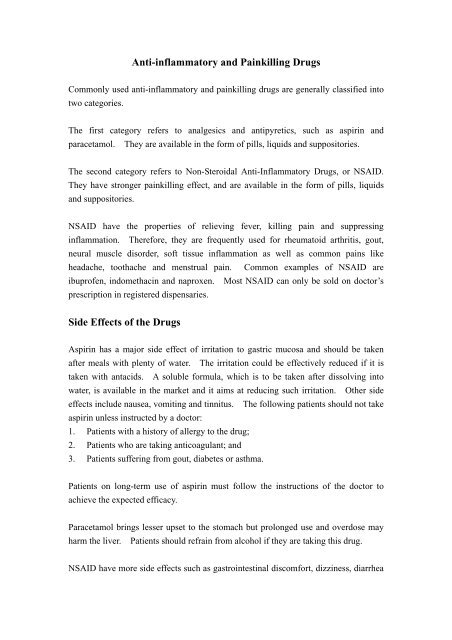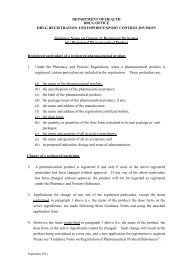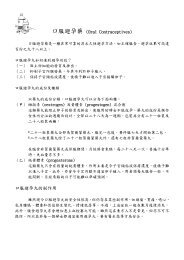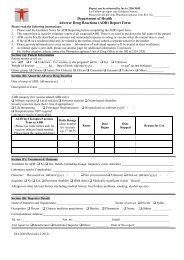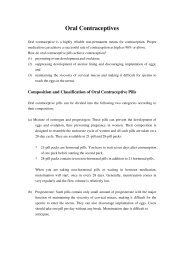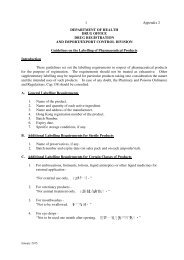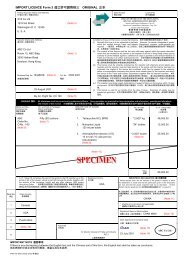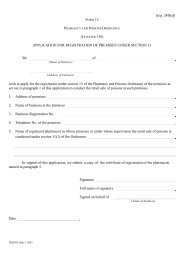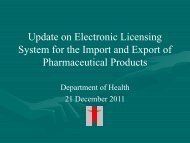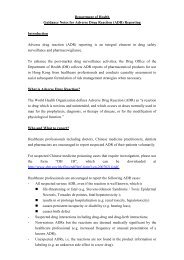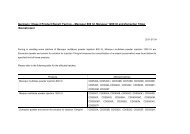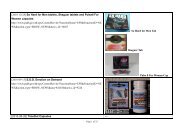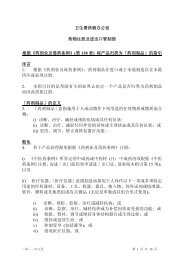Anti-inflammatory and Painkilling Drugs
Anti-inflammatory and Painkilling Drugs
Anti-inflammatory and Painkilling Drugs
You also want an ePaper? Increase the reach of your titles
YUMPU automatically turns print PDFs into web optimized ePapers that Google loves.
<strong>Anti</strong>-<strong>inflammatory</strong> <strong>and</strong> <strong>Painkilling</strong> <strong>Drugs</strong>Commonly used anti-<strong>inflammatory</strong> <strong>and</strong> painkilling drugs are generally classified intotwo categories.The first category refers to analgesics <strong>and</strong> antipyretics, such as aspirin <strong>and</strong>paracetamol.They are available in the form of pills, liquids <strong>and</strong> suppositories.The second category refers to Non-Steroidal <strong>Anti</strong>-Inflammatory <strong>Drugs</strong>, or NSAID.They have stronger painkilling effect, <strong>and</strong> are available in the form of pills, liquids<strong>and</strong> suppositories.NSAID have the properties of relieving fever, killing pain <strong>and</strong> suppressinginflammation. Therefore, they are frequently used for rheumatoid arthritis, gout,neural muscle disorder, soft tissue inflammation as well as common pains likeheadache, toothache <strong>and</strong> menstrual pain. Common examples of NSAID areibuprofen, indomethacin <strong>and</strong> naproxen. Most NSAID can only be sold on doctor’sprescription in registered dispensaries.Side Effects of the <strong>Drugs</strong>Aspirin has a major side effect of irritation to gastric mucosa <strong>and</strong> should be takenafter meals with plenty of water. The irritation could be effectively reduced if it istaken with antacids. A soluble formula, which is to be taken after dissolving intowater, is available in the market <strong>and</strong> it aims at reducing such irritation. Other sideeffects include nausea, vomiting <strong>and</strong> tinnitus. The following patients should not takeaspirin unless instructed by a doctor:1. Patients with a history of allergy to the drug;2. Patients who are taking anticoagulant; <strong>and</strong>3. Patients suffering from gout, diabetes or asthma.Patients on long-term use of aspirin must follow the instructions of the doctor toachieve the expected efficacy.Paracetamol brings lesser upset to the stomach but prolonged use <strong>and</strong> overdose mayharm the liver. Patients should refrain from alcohol if they are taking this drug.NSAID have more side effects such as gastrointestinal discomfort, dizziness, diarrhea
or even gastrorrhagia. They should be used only on doctor’s prescription <strong>and</strong> takenafter meals with antacids.Pregnant or breastfeeding women <strong>and</strong> patients suffering from peptic ulcer shouldnever take NSAID. In case of loose or black stool after medication or side effectsincluding severe headache, diarrhea, swollen eyes or skin rash, consult a doctor rightaway.Life AdaptationsPatients suffering from different kinds of rheumatic diseases need frequent medicationto ease their pain. Despite this, the best way to reduce the side effects of medicationis to avoid prolonged dependence. Patients should follow their doctor’s instructions<strong>and</strong> take medication only when necessary. They can try physiotherapy, physicalexercise or hydrotherapy. Analgesics for external application like wintergreenointment may also help. Staying happy <strong>and</strong> participation in social activities couldalso help lessen the dependence on anti-<strong>inflammatory</strong> <strong>and</strong> painkilling drugs.Storage of the <strong>Drugs</strong>The drugs should be kept in a cool <strong>and</strong> dry place. Generally, they do not need to berefrigerated unless otherwise stated in the drug labels. Also, they should be storedproperly to avoid accidents of mistaken consumption by children.


